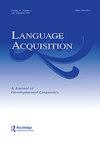Establishing upper bounds in English monolingual and Heritage Spanish-English bilingual language development
IF 1.3
3区 文学
0 LANGUAGE & LINGUISTICS
引用次数: 1
Abstract
ABSTRACT Quantificational elements such as some pose a challenge to young language learners, given their vague meaning and ability to take on an upper-bounded interpretation (relative to all) in certain contexts. The challenge is enhanced when a child is acquiring multiple languages that do not share a one-to-one mapping between their lexical entries with some. Such is the case with some in English and unos and algunos in Spanish. Indeed, Heritage Spanish-English bilinguals have been documented as diverging from monolingual children and adults in their interpretation of algunos, which is said to lexically encode this upper-bounded meaning, although early Heritage bilinguals do not demonstrate this knowledge robustly. In this article, we ask how pervasive this challenge is by (a) investigating whether the same pattern holds in English, where there are not two words for some, and (b) comparing the pragmatic process for some to other linguistic items that either invoke another pragmatic process (particularized conversational implicature) or a semantic upper bound. Our results strongly suggest that the extended process of fine-tuning of quantificational lexical entries within and across languages precedes a pragmatic comparison of alternatives, but at the same time, Heritage bilinguals demonstrate pragmatic awareness beyond generalized conversational implicatures.建立英语单语和传统西班牙语-英语双语语言发展的上限
定量元素(如一些)对年轻的语言学习者构成了挑战,因为它们的含义模糊,并且在某些上下文中(相对于所有人)有能力进行上限解释。当孩子正在学习多种语言,而这些语言的词汇条目之间没有一对一的映射时,挑战就会增加。英语中的some和西班牙语中的unos和algunos就是这样。事实上,传统的西班牙-英语双语者在对algunos的解释上与单语儿童和成人有所不同,据说这在词汇上编码了这种上限意义,尽管早期的传统双语者并没有充分证明这一知识。在本文中,我们通过(a)调查在英语中是否存在相同的模式,其中一些没有两个单词,以及(b)将一些的语用过程与其他语言项目进行比较,这些语言项目要么调用另一个语用过程(特定的会话含义),要么调用语义上限,来询问这一挑战有多普遍。我们的研究结果强烈表明,语言内部和跨语言的量化词汇条目的扩展微调过程先于替代的语用比较,但与此同时,传统双语者表现出超出广义会话含义的语用意识。
本文章由计算机程序翻译,如有差异,请以英文原文为准。
求助全文
约1分钟内获得全文
求助全文
来源期刊

Language Acquisition
Multiple-
CiteScore
2.30
自引率
8.30%
发文量
20
期刊介绍:
The research published in Language Acquisition: A Journal of Developmental Linguistics makes a clear contribution to linguistic theory by increasing our understanding of how language is acquired. The journal focuses on the acquisition of syntax, semantics, phonology, and morphology, and considers theoretical, experimental, and computational perspectives. Coverage includes solutions to the logical problem of language acquisition, as it arises for particular grammatical proposals; discussion of acquisition data relevant to current linguistic questions; and perspectives derived from theory-driven studies of second language acquisition, language-impaired speakers, and other domains of cognition.
 求助内容:
求助内容: 应助结果提醒方式:
应助结果提醒方式:


